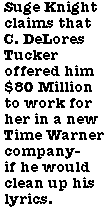 As
VIBE went to press, the debate over gangsta rap was taking more turns than
a Russian novel. But the stakes were real: The fate of Time Warner's relationship
with Interscope Records (home to Tupac Shakur) and Interscope's subsidiary,
Death Row (Snoop Doggy Dogg, Dr. Dre, Tha Dogg Pound), lay in the balance.
As
VIBE went to press, the debate over gangsta rap was taking more turns than
a Russian novel. But the stakes were real: The fate of Time Warner's relationship
with Interscope Records (home to Tupac Shakur) and Interscope's subsidiary,
Death Row (Snoop Doggy Dogg, Dr. Dre, Tha Dogg Pound), lay in the balance.
Time Warner reportedly was seeking to end its five-year association
with Interscope following months of public criticism by Senate Majority
Leader Bob Dole, former Bush administration drug czar William Bennett,
and C. DeLores Tucker (ousted Pennsylvania secretary of state reborn as
a rap music critic). Time Warner provided seed money for Interscope in
1990, eventually investing more than $40 million in the company; by 1994,
the media giant was earning a healthy $50 million profit on its investment.
On April 12, 1995, Time Warner (which also owns part of VIBE) sunk another
$80 million into Interscope, raising its stake to 50 percent. But in August,
as the high-profile hardcore label became a lightning rod for critics and
with Time Warner having no control over lyrics or cover art, it and Interscope
co-owners Ted Field and Jimmy Iovine were reportedly close to an amicable
parting of ways in August.
Just as negotiations were being finalized, however, Death Row CEO
Suge Knight claimed that Tucker, whom he'd met briefly in Seattle, asked
him to leave Interscope and work for her in a new Time Warner-distributed
label, a deal that would have involved $80 million for Knight and two state-of-the-art
recording studios-that is, if he would tone down Death Row's lyrics to
meet her unspecified standards.
 On
August 7, Michael Fuchs, newly installed chairman of Time Warner's music
division, flew from New York to the Coast to meet with Knight at the Beverly
Hills home of Dionne Warwick, a member of Tucker's National Political Congress
of Black Women. Fuchs, along with Warwick, waited for Knight for five hours,
but he never showed.
On
August 7, Michael Fuchs, newly installed chairman of Time Warner's music
division, flew from New York to the Coast to meet with Knight at the Beverly
Hills home of Dionne Warwick, a member of Tucker's National Political Congress
of Black Women. Fuchs, along with Warwick, waited for Knight for five hours,
but he never showed.
Three days later, when Field and Iovine heard about the wooing of Knight,
they halted negotiations with Time Warner and filed suit against the crusading
Tucker for interfering with contractual relationships, seeking unspecified
damages.
On August 17, Death Row, gangsta rap's most powerful label (its four
releases to date have all gone at least double platinum), filed its own
suit, accusing Tucker, Fuchs, Time Warner chairman Gerald Levin, Warner
Music Group, and Time Warner of contractual interference, extortion, and
violations of the Racketeer Influenced and Corrupt Organizations (RICO)
statute.
"Tucker certainly has had her own agenda with this thing the entire
time," says David Kenner, attorney for Death Row. "Our lawsuit is basically
a way for us to show that we won't allow this unethical act to go unnoticed."
But while Tucker admits she discussed a deal, she insists she never talked
about any money with Knight.
"Any efforts undertaken by Ms. Tucker with Death Row Records were undertaken
by her acting as a well-intentioned volunteer without any authorization
from Time Warner, Warner Music Group, Gerald Levin, or Michael Fuchs,"
says a Time Warner spokesperson.
"The controversy and all the other stuff can't stop what we are doing,"
says Death Row cofounder Dr. Dre. "Our business is making music, and that
won't change."
Allison Samuels
Back
 As
VIBE went to press, the debate over gangsta rap was taking more turns than
a Russian novel. But the stakes were real: The fate of Time Warner's relationship
with Interscope Records (home to Tupac Shakur) and Interscope's subsidiary,
Death Row (Snoop Doggy Dogg, Dr. Dre, Tha Dogg Pound), lay in the balance.
As
VIBE went to press, the debate over gangsta rap was taking more turns than
a Russian novel. But the stakes were real: The fate of Time Warner's relationship
with Interscope Records (home to Tupac Shakur) and Interscope's subsidiary,
Death Row (Snoop Doggy Dogg, Dr. Dre, Tha Dogg Pound), lay in the balance.





 On
August 7, Michael Fuchs, newly installed chairman of Time Warner's music
division, flew from New York to the Coast to meet with Knight at the Beverly
Hills home of Dionne Warwick, a member of Tucker's National Political Congress
of Black Women. Fuchs, along with Warwick, waited for Knight for five hours,
but he never showed.
On
August 7, Michael Fuchs, newly installed chairman of Time Warner's music
division, flew from New York to the Coast to meet with Knight at the Beverly
Hills home of Dionne Warwick, a member of Tucker's National Political Congress
of Black Women. Fuchs, along with Warwick, waited for Knight for five hours,
but he never showed.